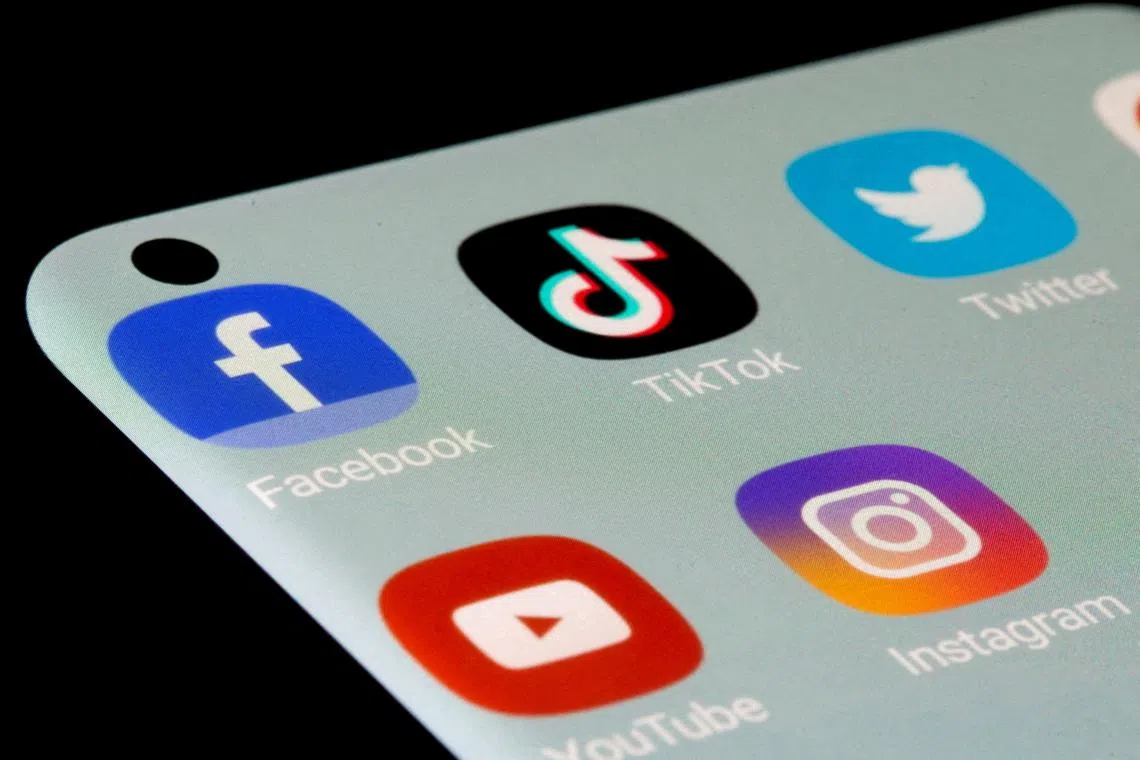Tired or overwhelmed due to social media? You’re more likely to share misinformation, says study
Sign up now: Get ST's newsletters delivered to your inbox

The study found that individuals experiencing social media fatigue become overwhelmed and struggle to critically evaluate misinformation.
PHOTO: REUTERS
SINGAPORE - Those who say they are tired or overwhelmed by social media are likelier to believe in misinformation and share it online – and “narcissistic” individuals are more likely to do so.
These findings were published by Nanyang Technological University (NTU) in the journal Scientific Reports in September.
The study surveyed more than 8,000 people from eight countries – Singapore, the United States, Malaysia, China, Thailand, Vietnam, Indonesia and the Philippines.
“Social media fatigue creates an information overload that hampers the cognitive judgment of social media users,” said Assistant Professor Saifuddin Ahmed from NTU’s Wee Kim Wee School of Communication and Information.
He led the study in collaboration with PhD student Muhammad Ehab Rasul from the University of California, Davis.
In such circumstances, individuals become overwhelmed and struggle to critically evaluate the misinformation they encounter, be it on Covid-19 or other topics, added Prof Saifuddin. Fake news on the Covid-19 pandemic was used as an example of misinformation in the study.
Algorithms on social media platforms that prioritise controversial, sensational and emotionally charged content are another explanation for social media fatigue, noted Prof Saifuddin.
“(Hence), being exposed repeatedly to such content may cause individuals to perceive it as accurate,” he said.
Survey methodology
The surveys were conducted in June 2022, with 8,070 responses collected; 1,008 were from Singapore.
Survey participants were first assessed on their social media fatigue by rating the extent to which they agreed to five statements on their social media use, such as whether they felt mentally exhausted or too tired to perform other tasks due to social media use.
Participants were then asked to rate the accuracy of a series of false claims about Covid-19, presented in a mock social media post style, and their likelihood of sharing these claims.
One such post read: “Coconut is effective in reducing Covid-19 symptoms”, while another read: “Covid-19 vaccinations are dangerous and ineffective against Omicron variants”.
Cognitive skills determine an individual’s ability to analyse information critically.
Participants were assessed for cognitive ability through a 10-item vocabulary test that is strongly associated with general measures of intelligence. It is used frequently in scientific research as a proxy to examine intelligence, NTU said.
The participants were also evaluated for behavioural traits that suggest narcissism through a personality inventory test.
Narcissism is characterised by an increased desire for attention, admiration and feelings of uniqueness.
According to the study, narcissism was singled out as a personality trait to be tested, as earlier literature has suggested that those with the “dark triad” of personality traits – narcissism, psychopathy and Machiavellianism – are more likely to share false information on social media.
Those with higher narcissistic tendencies more likely to share misinformation
The results found that survey participants from all eight countries who experience social media fatigue are more likely to fall for misinformation.
But the findings suggest that people in Singapore are more discerning. Whether someone from Singapore with social media fatigue shares misinformation depends on whether he thinks the misinformation is accurate.
In the other seven countries, however, those who experience higher levels of social media fatigue can share misinformation, regardless of perceptions of accuracy.
The researchers further investigated how cognitive and narcissistic traits affected the relationship between social media fatigue and sharing misinformation, and found that individuals with higher narcissistic tendencies are more likely to perceive the misinformation as accurate and share it on social media when fatigued.
Across all eight countries, respondents who scored high on narcissism and low on cognitive ability were the most likely to share misinformation due to social media fatigue.
Prof Saifuddin said: “With high levels of fatigue, these individuals could be sharing misinformation as they may be trying to seek attention and gain social influence without applying critical thinking.
“This tendency to share misinformation is particularly relevant for misinformation that is often characterised by sensational and controversial content eliciting strong emotional reactions from the audience.”
Prof Saifuddin noted that excessive fatigue may also amplify impulsivity – or the tendency to act without thinking – among narcissists with low cognitive ability.
He said: “Narcissists prefer immediate rewards and satisfaction rather than delayed gratification. Thus, it is likely that when accompanied by high fatigue and limited cognitive ability, narcissists do not make sound judgments about misinformation and share them due to their impulsive nature.”
Not a ‘one-size-fits-all’ approach
With millions of users relying on social media as a source of news and entertainment and as a mode of communication, addressing social media fatigue and its consequences is imperative, said the researchers.
“It is essential to study cognitive ability and narcissism in conjunction, as they can offer important insights into the psychology of misinformation belief and sharing, allowing academics and policymakers to propose strategies to minimise the harmful impact of misinformation,” the study said.
The findings that individuals with particular personality and cognitive traits are more susceptible to misinformation propagation than others suggest the need for interventions tailored to specific groups rather than one-size-fits-all approaches, the researchers added.
They also recommend that besides regulations to restrict the spread of misinformation and raising digital literacy, policymakers and social media companies should also adopt interventions aimed at reducing social media fatigue.
This will not only directly address the issue of fatigue but may also limit misinformation propagation because of the fatigue, they said.



